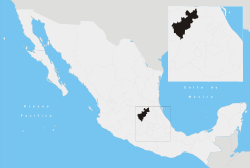San Juan del Río
| San Juan del Río | |
|---|---|
| City | |
|
Partial view of San Juan del Río (taken from "Cerro Gordo" hill). | |
| Coordinates: 20°23′N 99°59′W / 20.383°N 99.983°WCoordinates: 20°23′N 99°59′W / 20.383°N 99.983°W | |
| Country | Mexico |
| State | Querétaro |
| Municipality | San Juan del Río Municipality |
| Government | |
| • Municipal president | Fabián Pineda Morales (PRI) |
| Area(municipality) | |
| • Total | 799.9 km2 (308.8 sq mi) |
| Population (2015) | |
| • Total | 241,699 (city); 305,000 (municipality) |
| HDI (2000) | 0.8035 |
| GDP (per capita) |
US$6.980,00 2000 |
| WOEID | 143928 |
| Website | http://www.sanjuandelrio.gob.mx |
San Juan del Río is a city (2010 census pop. 241,699) and administrative seat of the surrounding San Juan del Río Municipality (pop. 208,462) in the central Mexican state of Querétaro. The population in July, 2007 is calculated in 128,270 for the city and 217,980 for the municipality.
Both the city and municipality have the second-highest population in the state. The municipality has an area of 799.9 km2 (308.8 sq mi).
It is on the country's central plateau (altiplano), 50 km (31 mi) southeast of state capital, Santiago de Querétaro, at 20°23′N 99°59′W / 20.383°N 99.983°W and an elevation of 1922 m. Famous for its opals, mined at nearby La Trinidad, it is also an agricultural center (corn, wheat, sugarcane, beans, alfalfa, fruit, and livestock) and has some light industry. A number of wineries are also located in the vicinity.
It is connected to Santiago de Querétaro and Mexico City by the mainline freight railway and Federal Highway 57.
History
The city was founded on the Feast of Saint John the Baptist June 24, 1531 by Fernado de Tapia, an Otomí chieftain that converted to Catholicism and dropped his Native name Conín. San Juan was one of the first Spanish settlements outside the Valley of Mexico and thus marked the beginning of the colonisation of Northern and Western Mexico, including the city of Querétaro which was founded one month later. The settlement became important since it was an obliged stop en route to the rich mining regions of Guanajuato, Zacatecas and San Luis Potosí.
Puente de la Historia (Bridge of History)
The stone bridge construction started on the 9th of February 1710 by the Mexican architect Pedro de Arrieta. The bridge was completed on the 23rd of January 1711 and soon became the most transited bridge in Mexico as it was the main connection between Mexico City and the northern states.
The bridge has a greater historical importance as it was the main way to get to Mexico City for all of those who fought during the Mexican Independence and Mexican Revolution.
Cultural events
- January 17: Feast of San Antonio (Blessing of the Animals)
- February 2: Day of the Candelaria (Blessing of the Seeds)
- March 1: Jesusito de la Portería
- March 3: Feast of the Holy Cross
- Around June 24: City Fair, Feast of Patron Saint Saint John the Baptist and Anniversary of the City's Foundation.
- November 22: Feast of Santa Cecilia
- December 11: Procession of the Farolitos
Entertainment in San Juan del Río
- City Fair: The San Juan's Fair is celebrated during the month of June to commemorate the Anniversary of the City's foundation and the Patron Saint John the Baptist.
- Goal 7 San Juan del Río, Football 7 field "Goal 7" near the México-Querétaro highway.
References
- Link to tables of population data from Census of 2005 INEGI: Instituto Nacional de Estadística, Geografía e Informática
- Querétaro Enciclopedia de los Municipios de México
External links
- Gobierno Municipal de San Juan del Río Official website
